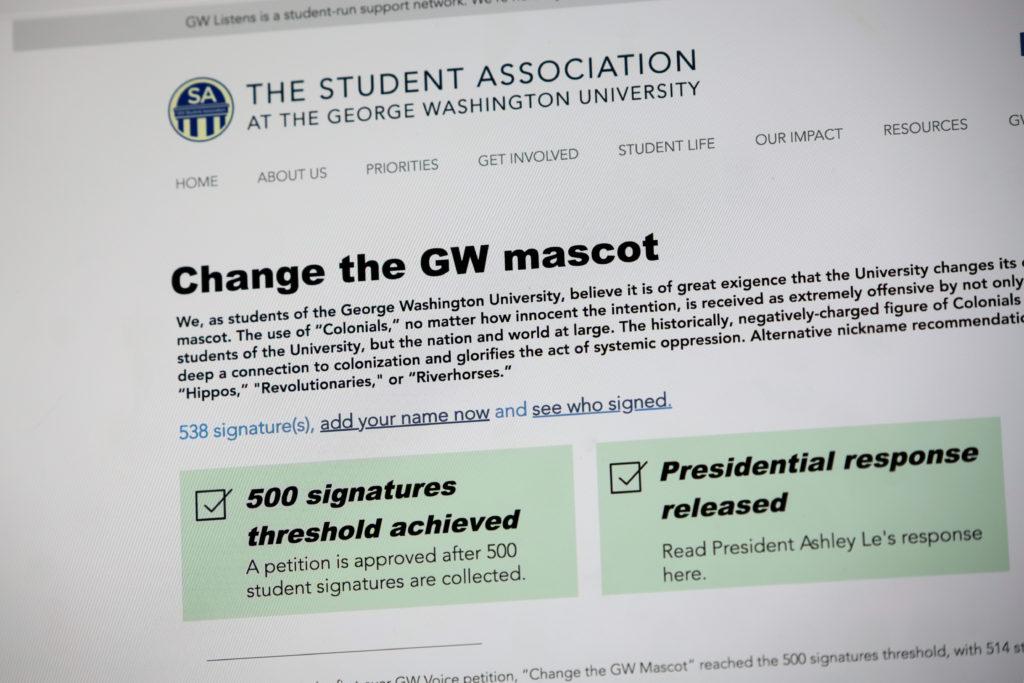One year after the Student Association created an online petitioning platform, just one student organization has used the tool.
The platform, called GW Voice, was created to give students a way to elevate their concerns to their student representatives and, in turn, some of the University’s top administrators. But at least four student organizations opted to use different mediums to launch petitions instead of using the SA’s platform over the past year.
Students in organizations like Graduate Students United, J Street U at GW and the Asian American Student Association circulated petitions last year without the tool.
Once a petition posted on GW Voice reaches 25 signatures, it is publicly posted on the SA website, and students can then sign their name. If a petition reaches more than 500 signatures, the SA president is required to respond to the post in a public statement.
GW Voice is a revamped version of an aged feature on the SA’s website that allowed students to submit ideas about advocacy projects they want student leaders to tackle.
Students for Indigenous and Native American Rights is the only student organization that has used the petitioning tool to advocate for changing GW’s nickname from the Colonials to a less “offensive” title. Student Association President Ashley Le responded to the petition once it garnered 500 signatures in May, urging officials to listen to students’ call for a nickname change.
Senior Annabel LaBrecque, the co-president of SINAR, said the “Change the GW Mascot” petition was initially launched on change.org and was then uploaded to GW Voice. She said she did not know the SA’s tool existed, but other students who signed onto the change.org petition relocated it to GW Voice.
LaBrecque said neither method of launching a petition – through the SA platform or an alternative medium – was significantly more effective than the other. But she said the SA platform is “effective to a degree” because the SA president can prompt officials to act.
Jared Diamond, an officer of the Jackie and Rachel Robinson Society, launched a petition in October to preserve the Jackie Robinson Project, a 20-year-old program that hosts programming honoring the baseball legend and civil rights activist, that officials plan to terminate. The petition has received 510 signatures since it was released on a Google form, he said.
Diamond said he would have used the SA’s tool if he knew it existed because the SA is required to respond to a petition that reaches 500 signatures. The platform could have elevated students’ concerns about the impact of ending the project but also would have likely excluded opinions from faculty or other signatories, he said.
“As far as the SA goes, they don’t really care about the signatures, they’re just looking out for students,” he said. “We had a lot of people who had graduated from the school and people’s parents who signed, but that’s not really what the SA is looking for.”
Student leaders from J Street U at GW, the Asian American Student Association and Graduate Students United – the other organizations that launched petitions outside of the SA’s platform – did not return multiple requests for comment.
Le, the SA president, said the organization has encouraged student groups on social media to use the tool because the SA can ensure the petition reaches administrators by issuing public statements.
“Proactive outreach is key – we have reached out to groups in the past that are looking to advance an issue with the administration and get them connected to our tool if they think it would be helpful,” she said in an email.
She said petitions launched through the SA platform are more likely to be recognized and responded to by officials than petitions launched through an alternative platform because the SA’s platform only accepts signatures from students.
“We created the platform because it allows administrators to verify that the people requesting some sort of action or policy are actually students,” she said in an email. “It’s key that when we bring ideas to the administration, they accurately know how many people it was that supported that proposal.”
She declined to say why student groups that launched a separate petition have not used the SA’s platform. She also declined to say how many students have contacted the SA about launching a petition.
“The effort to rename the school’s mascot – the only petition to get more than 500 signatures, so far – helped lend that issue legitimacy to administrators,” she said in an email. “That’s what this platform delivers, over say, a change.org petition, which can be created immediately by anyone and shared with anyone.”





